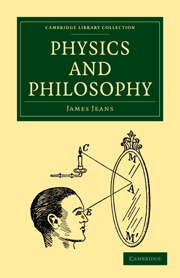Book contents
- Frontmatter
- Contents
- Preface
- I What are Physics and Philosophy?
- II How do we know? (Descartes to Kant; Eddington)
- III The two voices of Science and Philosophy (Plato to the present)
- IV The Passing of the Mechanical Age (Newton to Einstein)
- V The New Physics (Planck, Rutherford, Bohr)
- VI From Appearance to Reality (Bohr, Heisenberg, de Broglie, Schrödinger, Dirac)
- VII Some Problems of Philosophy
- Index
II - How do we know? (Descartes to Kant; Eddington)
Published online by Cambridge University Press: 07 September 2010
- Frontmatter
- Contents
- Preface
- I What are Physics and Philosophy?
- II How do we know? (Descartes to Kant; Eddington)
- III The two voices of Science and Philosophy (Plato to the present)
- IV The Passing of the Mechanical Age (Newton to Einstein)
- V The New Physics (Planck, Rutherford, Bohr)
- VI From Appearance to Reality (Bohr, Heisenberg, de Broglie, Schrödinger, Dirac)
- VII Some Problems of Philosophy
- Index
Summary
THE SOURCES OF KNOWLEDGE
We have already noticed how knowledge is gained by establishing relations between an inner process of understanding in our private minds and the facts of that public outer world which is common to us all. As Plato pointed out, the use of a common language is based on the supposition that such relations can be established by all of us.
In the period we have been considering, science claimed only one source of knowledge of the facts and objects of the outer world, namely the impressions they make on the mind through the medium of the senses. Yet the untrustworthiness of the senses had been one of the commonplaces of philosophy from Greek times on, and if the same facts and objects of the outer world made different impressions on different minds, where did science stand? If we trusted to individual sense-impressions, we could never get beyond the position described by Protagoras (c. 481—411 B.C.): ‘What seems to me is so to me, what seems to you is so to you’; each individual would become his own final arbiter of truth, and there could be no body of objective knowledge. Six centuries before Christ, in the earliest days of Greek philosophy, Thales of Miletus had urged the importance of gaining a substratum of facts, independent of the judgment of individuals, on which a body of objective knowledge could be built.
- Type
- Chapter
- Information
- Physics and Philosophy , pp. 32 - 81Publisher: Cambridge University PressPrint publication year: 2009First published in: 1942

